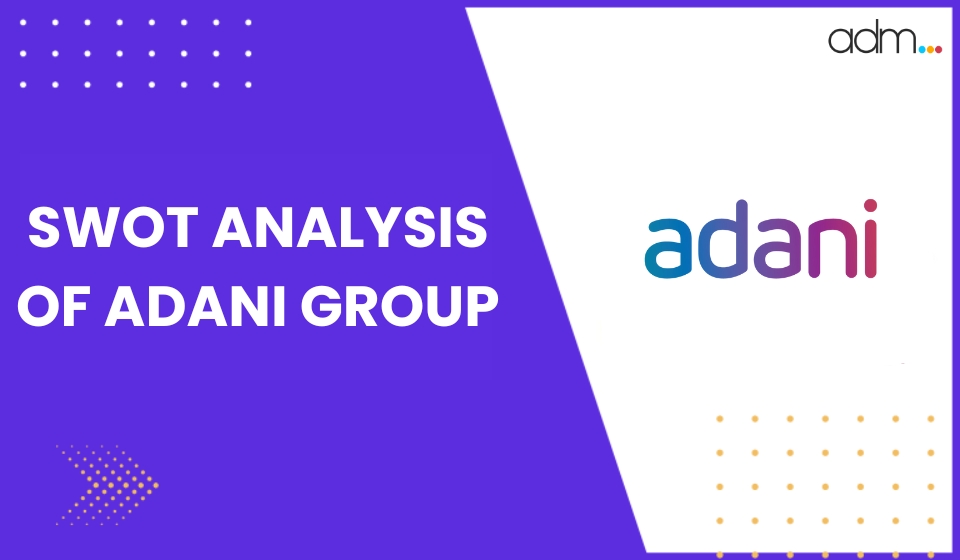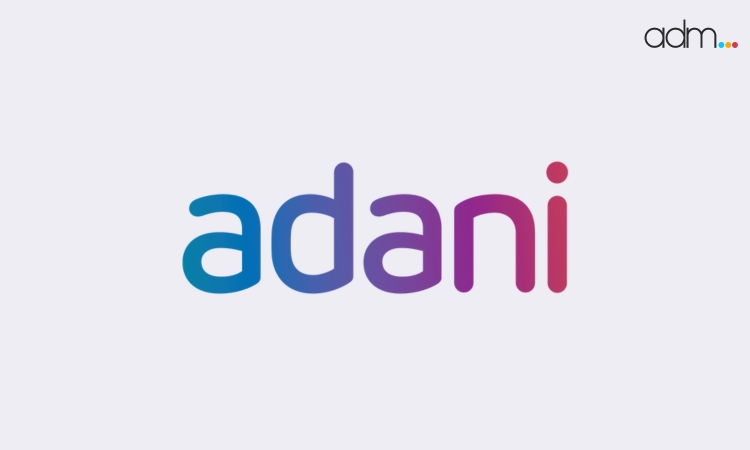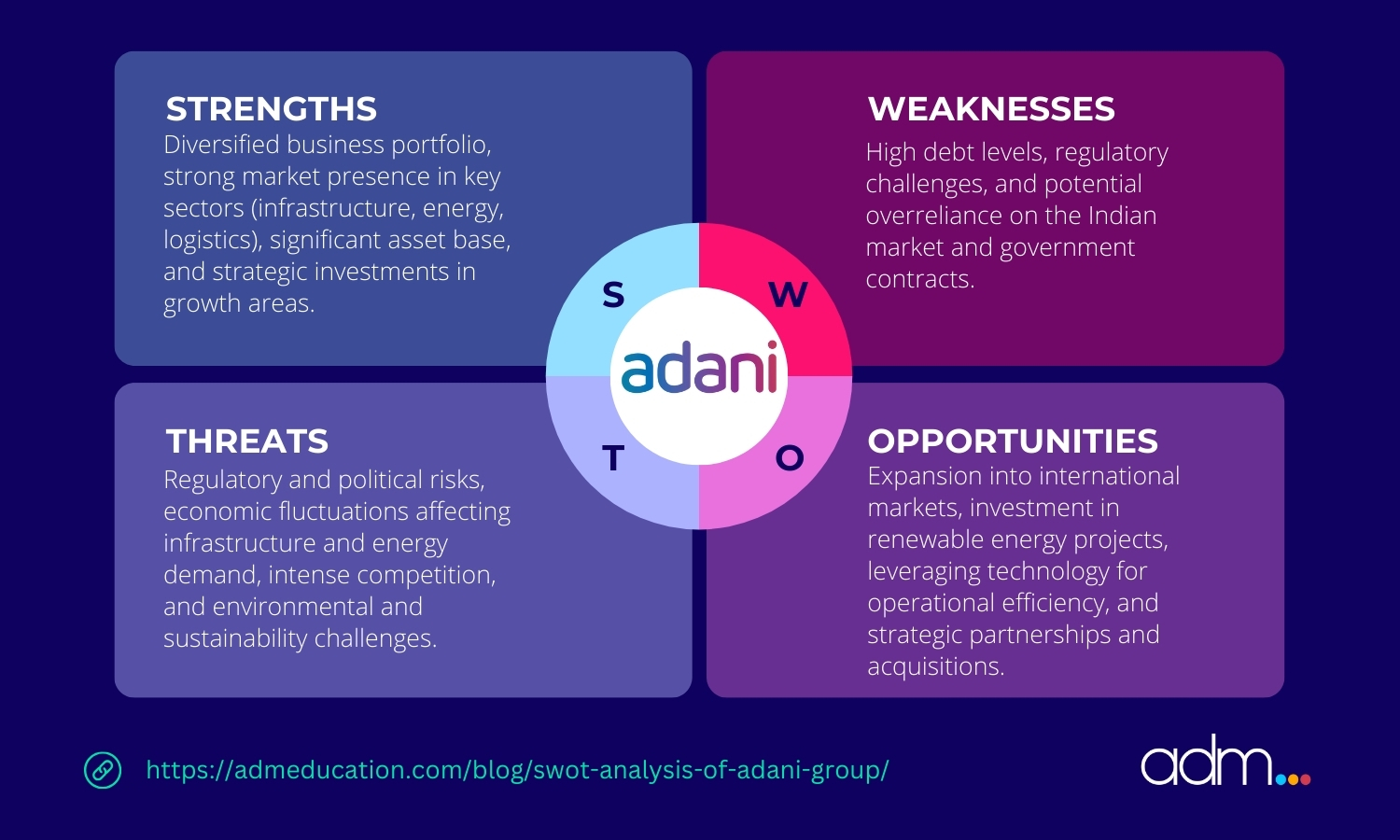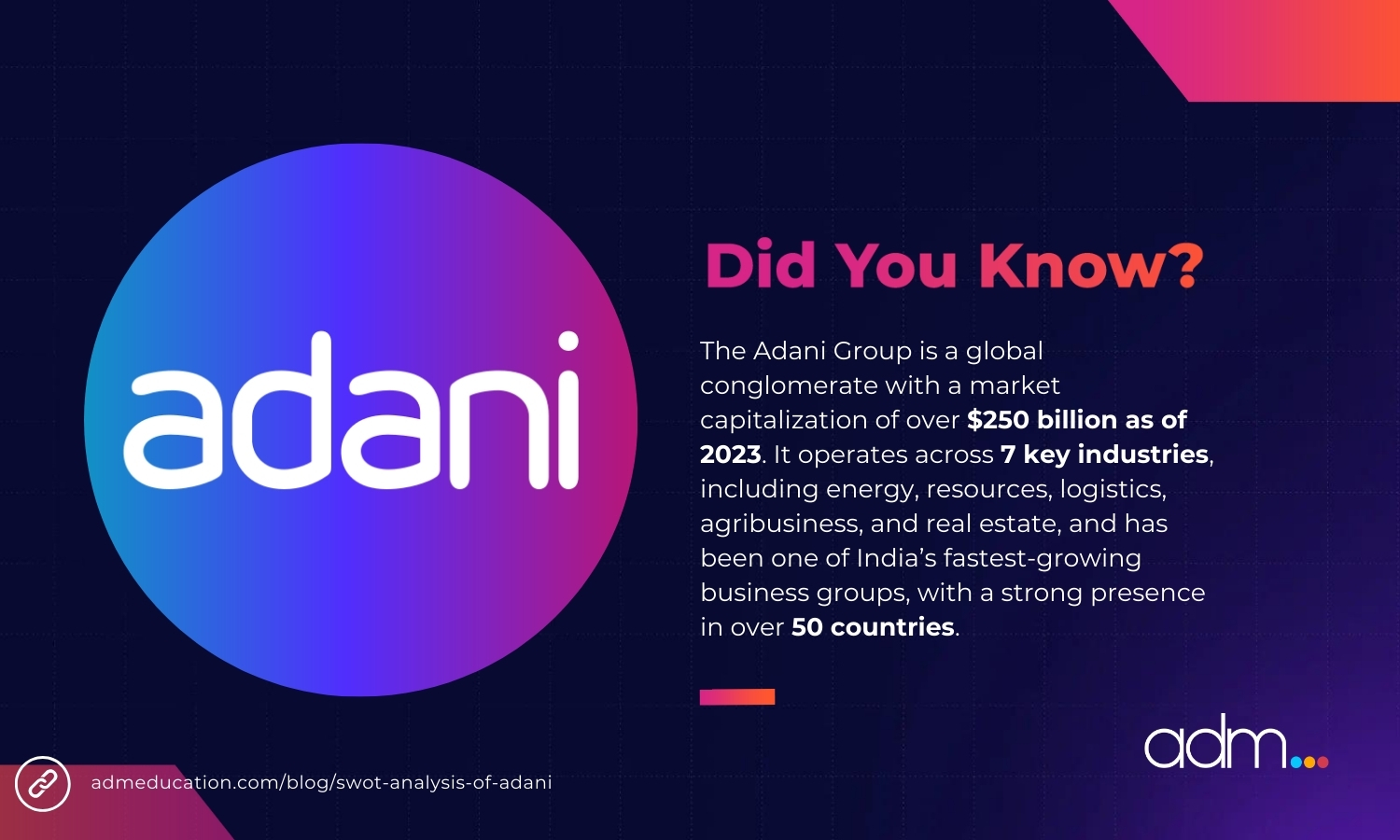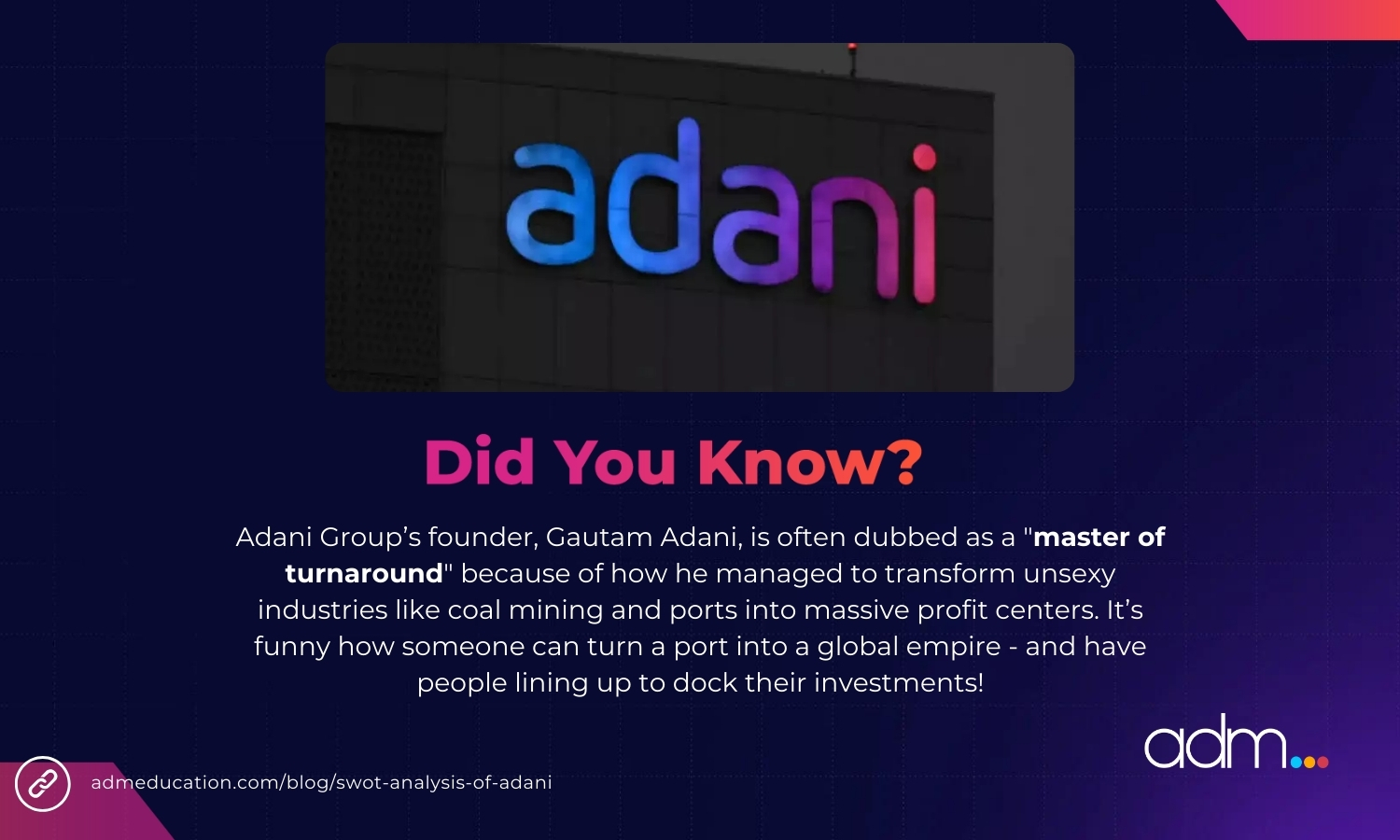The Adani Group is an Indian conglomerate having a diversified portfolio in logistics, infrastructure, energy, and many more segments.
Let’s see more about the company’s SWOT analysis, financials, strategies, etc in this blog in detail.
About Adani Group
Adani Group is India’s largest and fastest-growing firm since 1988. Having its expertise in different sectors like logistics, agriculture, and energy, the company registers exponential revenue every year. It has headquarters in Ahmedabad, Gujarat and is owned by the Adani family trust.
It is the giant producer of thermal power in the country and has the biggest integrated infrastructure conglomerate under its name. It also owns Fortune brand edible oils which is India’s most famous vegetable oil company. The company is truly committed to the nation and Society and has been sincerely contributing to the development and growth of India in a different manner.
Adani Group at a Glance
| Chairman | Gautam Adani |
| Year of Establishment | 20 July 1988 |
| Annual Revenue (as of FY24) | US$37 billion |
| Net Income (as of FY24) | US$5.1 billion |
| Origin | Ahmedabad, Gujarat, India |
| Type of Company | Corporate group |
| Total no. of employees | 43,000+ |
| Subsidiaries |
|
Services offered by the Adani Group
- Port management
- Electric power
- Mining
- Renewable energy
- Airport operations
- Oil and gas
- Food processing
- Infrastructure
SWOT Analysis of Adani Group
The SWOT analysis helps brands recognize their strong points, weak elements, opportunities, and threats.
Strengths of Adani Group
Strengths define the strongest points of a business that makes it distinctive in the market.
-
Unwavering vision
Adani Group has been leading the market with its strong vision that gives it unbelievable progress. The company incorporates sustainable and inclusive development focused on offering more benefits to its stakeholders.
-
Key values
Adani Group has deep roots in a value system consisting of teamwork, trust, commitment, and dedication. Today the company has more than 40000 employees and they work together under the visionary leadership of the CEO.
-
Inspiring leadership
Gautam Adani is the leading light of the Adani group and has been proven the most powerful leader and will entrepreneur. His wise investments and passion to move ahead without getting distracted by failure have made him an exemplary leader in the market.
-
Different investments
Adani Group is present in different industries including energy, logistics, steel power, coal infrastructure, and real estate. This makes the company a strong brand in almost all regions of industrial development.
-
Excellent financial status
Adani group has witnessed a roller coaster in financial status but under the visionary leader, the company has booked excellent profit. All equity share capital and debts have been again invested into different assets that give high revenues. This indicates that the operation efficiency is growing consistently.
Weaknesses of Adani Group
Weaknesses are those segments in the business that need improvement.
-
Legal issues
Adani Group has always been instrumental in committing towards society. The company has been confronted with an allegation of illegal coal mining under which the case is going on in court. It also has various issues like illegal land purchases in Mundra.
-
Unsatisfied shareholders
Due to some recent concerns like Hindenburg’s negative reports about Adani, the prices of the shares failed sharply which led to unhappy shareholders. Most of them had booked a huge loss during this period. These clashes may impact the company’s brand image while reducing the trust of shareholders in the Adani group.
-
High-risk portfolio
Recently, the Adani Group made acquisitions in the mining segment in a foreign country. This investment is not able to give promised returns to the company. Additionally, the company’s heavy investment in real estate and infrastructure is quite time-consuming to be monetized.
Opportunities for Adani Group
Opportunities bring a lot of factors that the company can capitalize on to improve the returns.
-
Expansion in renewable energy
There is a lot of potential in renewable and sustainable energy sources like wind. Adani Group is already present in power which makes it very simple to expand its presence in wind and hydroelectric power.
-
Developing power sector
The statistics from the Government of India indicate that the power capacity will involve approximately 88.5 GW. From this, 5.3 GW will be of nuclear power, 10.8 GW will be of hydropower, and 72.3 GW will be of thermal power. Adani group can benefit from this government’s 12th five Year Plan.
-
Infrastructure development
The Government of India has decided to expand highways, roads, airports, ports, civil aviation as well as power infrastructure sectors. Adani Group can easily target these segments and can expand its services into it.
-
Entry in education & healthcare
The education and healthcare segments in India are transforming. Adani Group can expand business in these sectors using its financial status and operational excellence. The medical colleges, hospitals, and educational institutions will bring social development and new methods to get revenue.
Threats to the Adani Group
Factors that can be harmful to business development come under the threat pattern.
-
Foreign assets
In the last 10 years, the infrastructure sector has evolved immensely. However, a huge investment of around 20 billion US dollars could be seen in the next two years in infrastructure. Therefore, this is a big opportunity for foreign infrastructure companies to come to India. This potential threat to Adani Group.
-
Negative views
The Indian giants like Birla or Tata have been in the market for decades, and Adani Group has come to the market lately due to which it does not have as much goodwill or trust as these Indian conglomerates have.
-
Regulatory issues
Adani Group is instrumental in different sectors like infrastructure mining energy power etc. However, fluctuations in regulations, government policies, and environmental regulations can pose a major threat to the company’s operations. Stringent environmental regulations and rules or any big change in export or import tariffs can impact the operational cost while also bringing delays in executing projects. Here it is crucial to stay compliant with the continuously changing regulations that may be challenging for the company.
-
Economic downtime
A domestic or global slowdown can impact the company’s profitability and growth to a greater extent. Economic downturns may lead to minimized customer spending, reduced industrial activities, and delays in executing big projects. This will impact the demand for the services and products of the company which will further impact the revenue streams. Also, fluctuations in exchange rates and interest rates may affect the financial status of the group specifically when they are global investments or operations.
Competitors of Adani Group
Here are the top 5 competitors of Adani Group –
- Reliance Industries Ltd: Reliance Industries is the major competitor to Adani Group in different sectors like telecommunications, petrochemicals, energy, etc.
- Tata Group: It is the largest conglomerate in India that competes directly with Adani in different sectors like infrastructure, energy, goods etc.
- Larsen & Toubro: It is a leader in the construction infrastructure and engineering segments and competes directly with the Adani Group in these sectors.
- JSW Group: It is a major competitor to the Adani group in energy, steel, and infrastructure segments.
- Bharti Enterprises: It competes with Adani Group in the telecommunication segment as Bharti Airtel has extensive telecommunication network infrastructure.
Conclusion
Adani Group has a strong position in the market in its energy and infrastructure segment. To keep its market presence strong the group should make use of its strengths and convert all the weaknesses into them.
The company should see different opportunities in the changing market situations and should also try to mitigate threats that will help in adapting to the fluctuating market situations along with regulatory changes.
Janardan Das is a seasoned Growth Lead with over five years of experience in digital marketing. He specializes in crafting effective marketing strategies, including SWOT analysis and digital marketing courses, to help businesses thrive in the competitive landscape. He is passionate about sharing his knowledge and insights, empowering others to succeed in their marketing endeavors.

